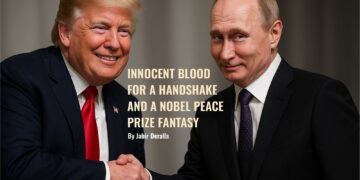European reactions to the 2025 Trump-Putin summit in Alaska were marked by deep skepticism, strategic caution, and a firm reaffirmation of support for Ukraine. Although the summit did not yield a concrete peace agreement, it prompted a wave of diplomatic responses across Europe.
Leaders from the EU, UK, and NATO emphasized that any resolution to the war in Ukraine must include “ironclad security guarantees” for Ukraine and uphold its sovereignty. They rejected any territorial concessions and insisted that Ukraine must be central to any negotiations.
UK Prime Minister Keir Starmer acknowledged Trump’s efforts as a step toward peace but stressed the need for continued sanctions and robust security guarantees to deter further Russian aggression.
French President Emmanuel Macron warned against trusting Russia’s commitments, citing its history of breaking agreements, and pledged continued support for Ukraine.
German Chancellor Friedrich Merz reiterated unwavering solidarity with Ukraine, emphasizing the importance of safeguarding European security interests.
Italian Prime Minister Giorgia Meloni expressed cautious optimism, viewing the summit as an opportunity to discuss peace, while reaffirming Italy’s commitment to supporting Ukraine alongside Western allies.
Polish Prime Minister Donald Tusk highlighted the importance of Western unity in the face of Russian aggression and emphasized that Russia respects only strength.
European officials expressed apprehension over the summit’s format, particularly the absence of Ukrainian representation and the potential for unilateral decisions by Trump. The Lithuanian defense minister voiced “absolute distrust” in Putin’s intentions, citing ongoing Russian attacks on Ukrainian civilians.
The summit’s resemblance to the 2018 Helsinki meeting, where Trump appeared to side with Putin over U.S. intelligence agencies, further fueled European skepticism. Analysts warned that Putin might exploit the one-on-one meeting format to manipulate outcomes in Russia’s favor.
In response to the summit, European nations reaffirmed their commitment to Ukraine’s defense and sovereignty. The EU and NATO emphasized the necessity of including Ukraine in any peace negotiations and pledged to continue supporting Ukraine through military aid and sanctions against Russia.
The summit underscored the importance of transatlantic unity and the need for a coordinated approach to address the ongoing conflict in Ukraine.
The prevailing international narrative echoes much of the sentiment that Trump’s summit risked legitimizing Putin while downgrading Ukraine’s role and interests. AP News emphasized that Putin regained a place on the global stage despite war crimes charges, as the summit concluded with no direct progress, prompting criticism that Trump ceded the initiative.
Washington Post labeled the summit a U.S. setback and a propaganda victory for Putin, noting that Trump dropped his prior insistence on a ceasefire and echoed Kremlin demands.
Reuters reported European leaders released a joint statement supporting Trump’s pursuit of peace but underscored that negotiations must include Ukraine, protect its sovereignty, and maintain sanctions.
The Guardian and others noted the optics of Putin being warmly received, interpreting the meeting as a diplomatic triumph for Russia and a symbolic defeat for Western unity.
In his blistering political commentary “The Alaska Humiliation: A Theatrical Farce and a Failure Written in Advance – Putin’s Legitimacy, Trump’s Humiliation,” published on August 16, 2025, on Civil.Today, only hours after the Trump-Putin meeting, Jabir Deralla, journalist and political analyst, lays into the summit with vivid, damning critique. The opening quote is emblematic:
“Trump staged a show. Putin gained legitimacy. Ukraine and Europe paid the price. No peace, no justice—only optics, humiliation, and a gift to the aggressor. A theater on a red carpet, played out with Ukrainian blood. What was sold as diplomacy became the coronation of a war criminal.”
Deralla frames the summit as empty spectacle, devoid of substance—“a circus,” “grotesque,” and “cheap humiliation” financed with Ukrainian sacrifice. Putin, in Deralla’s words, was effectively coronated; Trump humiliated. Ukraine was erased from the table and Europe marginalized. His urgent clarion call: Europe must wake up and take real responsibility—the era of passivity must end.
This commentary anchors the broader European discourse: a condemnation of optics without substance and a rallying cry for proactive resistance against authoritarian aggression.
CIVIL MEDIA News Desk, in cooperation with ChatGPT















